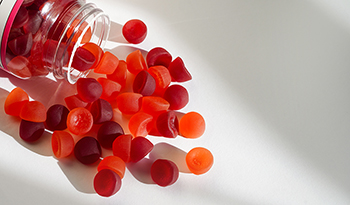Creatine: What It Is, How It Works, + 7 Proven Benefits
What Is Creatine?
Creatineis one of the most popular and effective food supplements. Used mostly to support muscle health and exercise performance, creatine also exerts anti-ageing, brain health, and other positive health benefits.
Creatine is a natural substance produced in the body in addition to a food supplement. It is composed of threeamino acids: L-arginine, L-glycine, and L-methionine. The liver, kidneys, and pancreas produce about half of the body's creatine supply, approximately 2 grams per day.
Food Sources of Creatine
Creatine is also provided from food sources such as red meat and seafood. One pound of raw beef or salmon provides 1 to 2 grams of creatine. Since plant-based diets lack creatine-rich sources such as animal meat and seafood, creatine supplementation may be important to maintain adequate total body creatine levels.
As a food supplement, creatine is available in several different forms. Creatine monohydrate is the recommended form based upon the scientific evidence.
What Does Creatine Do in the Body?
Creatine in the form of creatine phosphate enhances energy production in muscles for quick bursts of power and speed. When a muscle cell contracts, it requires energy produced by the release of one phosphate group from adenosine triphosphate (ATP), which is then converted to adenosine diphosphate (ADP). Creatine phosphate donates its phosphate group to convert ADP back to ATP. The energy-producing effects of creatine also occur in other tissues, particularly the brain.
In addition to its role as an energy source, creatine exerts antioxidant, anti-inflammatory, and immune-supportive effects.
Benefits of Creatine
Enhances Physical Performance
Creatineis one of the most well-researched food supplements. In sports nutrition, it is used to promote enhanced physical performance, muscle growth, and repair. The data is so strong from over 1,000 published human clinical trials showing creatine can increase the performance of high-intensity and/or repetitive strength exercises by 10 to 20% that the International Society of Sports Nutrition (ISSN), American College of Sports Medicine (ACSM), American Dietetic Association (ADA), and others have concluded that “creatine is the most effective food supplement for increasing exercise performance and muscle mass.”1
Given creatine’s role in energy production, its effectiveness makes sense. Since creatine helps replenish ATP, it allows athletes and fitness enthusiasts to train harder and longer. This benefit also allows muscles to respond to power and speed training to increase strength, muscle mass, and performance.
However, while creatine works to enhance performance, power, and speed training, results from studies looking at creatine supplementation in endurance sports or aerobic training have shown no benefit in trained individuals regarding enhanced performance.1,2Endurance sports or aerobic training are defined as large-muscle-mass activities over 3 minutes. While creatine supplementation may not directly enhance the performance of endurance athletes, it has been shown to help prevent muscle damage and aid in quicker recovery.3Furthermore, creatine supplementation may enhance performance in endurance activities requiring multiple intensity surges and/or during a spurt at the end of a race or event.4Included in these sorts of sports are mountain biking, cycling, triathlon, cross-country skiing, and rowing.
Boosts Muscle Growth and Lean Body Mass
Creatine supplementation has been shown to increase measures of lean body mass in human double-blind studies.1,5,6These benefits are mainly due to creatine-enhancing training efforts. Still, creatine also enhances the growth factors for muscle protein synthesis and decreases muscle breakdown, which may also contribute to its ability to increase lean body mass.
To determine the specifics of the benefits of creatine supplementation for muscle growth, researchers recently analyzed the results from 28 human clinical studies.6What the statistics demonstrated was that when creatine supplementation was combined with weight or resistance training in men, regardless of age, it produced an average increase in lean body mass of 1.46 kg (3.2 lbs), while in women, this increase was significantly less at 0.29 kg (0.6 lbs). Creatine failed to increase lean body mass in those not engaged in regular strength training exercises.
The benefits of muscle mass in older subjects are particularly important. As we age, there is a significant loss of muscle. This process is known as sarcopenia. For healthy ageing, a primary goal is preventing sarcopenia, which is critical as it is a major factor in physical function and quality of life. Creatine supplementation has been shown to improve physical performance, muscle function, and lean body mass in elderly men and women.7-10Supplementation with creatine (0.1 g per kg body weight) immediately after exercise produced the greatest benefit.
Promotes Water Retention
Creatine exerts additional effects beyond energy-enhancing and promoting muscle growth in response to high-intensity training. One key effect of creatine is that it promotes water retention in a way that promotes hydration,1which can improve exercise performance and heat tolerance. In a double-blind, placebo-controlled study of collegiate football players, those taking 5 g of creatine daily for four months had significantly less muscle cramping or strains, dehydration, and heat illness than those in the placebo group.11
Aids Recovery
Creatine also helps to reduce muscle damage and aids in recovery post-exercise. These results are again related to creatine’s effect on muscle energy production and some anti-inflammatory effects. Less muscle damage during exercise results in less after-exercise muscle soreness and quicker recovery. Human double-blind, placebo-controlled studies have shown creatine to lower blood markers for inflammation and improve other metabolic markers in endurance and high-intensity exercise, indicating that creatine supplementation may be useful in aerobic and anaerobic exercise recovery.3,12-15Less muscle damage and better recovery from training are important goals, especially for elite athletes.
Supports Healthy Ageing and Brain Health
Creatine exerts some anti-ageing and positive effects on brain health. It is well-known that ageing leads to a decline in muscle mass, bone density, cognitive function, and memory. Research suggests that creatine can improve overall health as we age by slowing the progression of declines in functional ability and enhancing blood sugar control, cholesterol, and triglyceride levels. Regarding brain health, several studies in older adults have shown that supplementation with 5g of creatine daily for six weeks improves memory and performance on intelligence and cognitive function tests.16-18
Boosts Mood and Brain Function
Creatine shows tremendous promise in improving mood and feelings of well-being.19Several human double-blind, placebo-controlled studies have confirmed that creatine supplementation can boost mood scores compared to a placebo.20,21Not only has creatine improved mood scores, but researchers have shown that creatine supplementation enhances brain energy production in key brain areas. Higher levels of brain energy were associated with more positive mood scores.
Supports Metabolic Health and Blood Sugar Control
Recent studies have demonstrated that creatine supplementation can enhance glucose tolerance and insulin sensitivity. This effect appears to be mediated by enhanced muscle creatine stores, which facilitate greater glucose uptake into muscle cells, improve cellular energy metabolism, and lead to favorable changes in muscle mass and function, ultimately supporting overall metabolic health.
Is Creatine Safe?
The International Society of Sports Nutrition has concluded that creatine is safe and well-tolerated in both short and long-term use, including at dosages as high as 30 grams a day for 5 years in healthy individuals. This opinion is based upon over a thousand human clinical studies with participants ranging from infancy to the elderly and frail. Creatine has also been in the marketplace since the 1990s, with billions of servings of creatine. Previous reports of side effects or potential adverse reactions have all been refuted in well-controlled human clinical studies. Rather, as noted above, creatine monohydrate supplementation has been found to reduce the incidence of many of these anecdotally reported side effects.1
Should Women Take Creatine?
Yes, women should absolutely take creatine. Although a higher proportion of men have historically used creatine—largely due to its association with muscle building and sports performance—recent research suggests that women may experience equal or even greater relative overall health benefits from creatine supplementation compared to men. In women, not only has creatine been shown to support improvements in strength, endurance, lean body mass, and functional performance, but it may also offer metabolic and cognitive advantages to women. Some studies suggest these advantages are due to differences in baseline muscle and brain creatine stores and hormonal influences.24,25
Dosage
Generally, a daily dose of 3 to 5 grams is recommended. Taking it after a workout may produce the best results. A loading phase of 5 grams of creatine taken four times daily for 5-7 days is often recommended to saturate muscles with creatine to ramp up benefits quicker. Since creatine draws water into muscles, it is important to ensure adequate water intake to support proper function. That means roughly 8-10 glasses of water daily, especially during the loading phase.
References:
- Kreider RB, Kalman DS, Antonio J, et al. International Society of Sports Nutrition position stand: safety and efficacy of creatine supplementation in exercise, sport, and medicine. J Int Soc Sports Nutr. 2017;14:18.
- Fernández-Landa J, Santibañez-Gutierrez A, Todorovic N, Stajer V, Ostojic SM. Effects of Creatine Monohydrate on Endurance Performance in a Trained Population: A Systematic Review and Meta-analysis. Sports Med. 2023 May;53(5):1017-1027.
- Wax B, Kerksick CM, Jagim AR, et al. Creatine for Exercise and Sports Performance, with Recovery Considerations for Healthy Populations. Nutrients. 2021 Jun 2;13(6):1915.
- Forbes SC, Candow DG, Neto JHF, Kennedy MD, Forbes JL, Machado M, Bustillo E, Gomez-Lopez J, Zapata A, Antonio J. Creatine supplementation and endurance performance: surges and sprints to win the race. J Int Soc Sports Nutr. 2023 Dec;20(1):2204071.
- Burke R, Piñero A, Coleman M, Mohan A, Sapuppo M, Augustin F, Aragon AA, Candow DG, Forbes SC, Swinton P, Schoenfeld BJ. The Effects of Creatine Supplementation Combined with Resistance Training on Regional Measures of Muscle Hypertrophy: A Systematic Review with Meta-Analysis. Nutrients. 2023 Apr 28;15(9):2116.
- Delpino FM, Figueiredo LM, Forbes SC, Candow DG, Santos HO. Influence of age, sex, and type of exercise on the efficacy of creatine supplementation on lean body mass: A systematic review and meta-analysis of randomized clinical trials. Nutrition. 2022 Nov-Dec;103-104:111791.
- Davies TW, Watson N, Pilkington JJ, et al. Creatine supplementation for optimisation of physical function in the patient at risk of functional disability: A systematic review and meta-analysis. JPEN J Parenter Enteral Nutr. 2024 May;48(4):389-405.
- Johannsmeyer S, Candow DG, Brahms CM, Michel D, Zello GA. Effect of creatine supplementation and drop-set resistance training in untrained ageing adults. Exp Gerontol. 2016 Oct;83:112-9.
- Gualano B, Macedo AR, Alves CR, Roschel H, Benatti FB, Takayama L, de Sá Pinto AL, Lima FR, Pereira RM. Creatine supplementation and resistance training in vulnerable older women: a randomized double-blind placebo-controlled clinical trial. Exp Gerontol. 2014 May;53:7-15.
- Candow DG, Vogt E, Johannsmeyer S, Forbes SC, Farthing JP. Strategic creatine supplementation and resistance training in healthy older adults. Appl Physiol Nutr Metab. 2015 Jul;40(7):689-94.
- Kilduff LP, Georgiades E, James N, et al. The effects of creatine supplementation on cardiovascular, metabolic, and thermoregulatory responses during exercise in the heat in endurance-trained humans. Int J Sport Nutr Exerc Metab. 2004;14(4):443–460.
- Cooke MB, et al. Creatine supplementation enhances muscle force recovery after eccentrically-induced muscle damage in healthy individuals. J Int Soc Sports Nutr. 2009;6:13. doi: 10.1186/1550-2783-6-13.
- Yamaguchi S, Inami T, Ishida H, et al. The Effect of Prior Creatine Intake for 28 Days on Accelerated Recovery from Exercise-Induced Muscle Damage: A Double-Blind, Randomized, Placebo-Controlled Trial. Nutrients. 2024 Mar 20;16(6):896.
- Deminice R, Rosa FT, Franco GS, Jordao AA, de Freitas EC. Effects of creatine supplementation on oxidative stress and inflammatory markers after repeated-sprint exercise in humans. Nutrition. 2013 Sep;29(9):1127-32.
- Roberts PA, Fox J, Peirce N, et al. Creatine ingestion augments dietary carbohydrate mediated muscle glycogen supercompensation during the initial 24 h of recovery following prolonged exhaustive exercise in humans. Amino Acids. 2016 Aug;48(8):1831-42.
- Jaramillo AP, Jaramillo L, Castells J, Beltran A, Garzon Mora N, Torres S, Barberan Parraga GC, Vallejo MP, Santos Y. Effectiveness of Creatine in Metabolic Performance: A Systematic Review and Meta-Analysis. Cureus. 2023 Sep 15;15(9):e45282.
- Forbes SC, Candow DG, Ferreira LHB, Souza-Junior TP. Effects of Creatine Supplementation on Properties of Muscle, Bone, and Brain Function in Older Adults: A Narrative Review. J Diet Suppl. 2022;19(3):318-335.
- Roschel H, Gualano B, Ostojic SM, Rawson ES. Creatine Supplementation and Brain Health. Nutrients. 2021 Feb 10;13(2):586.
- Kious BM, Kondo DG, Renshaw PF. Creatine for the Treatment of Depression. Biomolecules. 2019 Aug 23;9(9):406.
- Kondo DG, Forrest LN, Shi X, et al. Creatine target engagement with brain bioenergetics: A dose-ranging phosphorus-31magnetic resonance spectroscopy study of adolescent females with SSRI-resistant depression. Amino Acids 2016:1941–1954.
- Yoon S, Kim JE, Hwang J, Kim TS, Kang HJ, Namgung E, Ban S, Oh S, Yang J, Renshaw PF, Lyoo IK. Effects of Creatine Monohydrate Augmentation on Brain Metabolic and Network Outcome Measures in Women With Major Depressive Disorder. Biol Psychiatry. 2016 Sep 15;80(6):439-447.
- Gualano B, de Salles Painelli V, Roschel H, et al. Creatine supplementation and glycaemic control in type 2 diabetes: a randomised, double-blind, placebo-controlled trial. Med Sci Sports Exerc. 2011;43(5):770-778.
- Gualano B, Novaes RB, Artioli GG, et al. Effects of creatine supplementation on glucose tolerance and insulin sensitivity in sedentary healthy males undergoing aerobic training. Amino Acids. 2008;34(2):245-250.
- Smith-Ryan AE, Cabre HE, Eckerson JM, Candow DG. Creatine Supplementation in Women's Health: A Lifespan Perspective. Nutrients. 2021 Mar 8;13(3):877.
- Candow DG, Chilibeck PD, Forbes SC, et al. Creatine supplementation and ageing musculoskeletal health. J Nutr Health Aging. 2019;23(3):251-259.
DISCLAIMER:This Wellness Hub does not intend to provide diagnosis...
















































































 Table of Contents
Table of Contents














